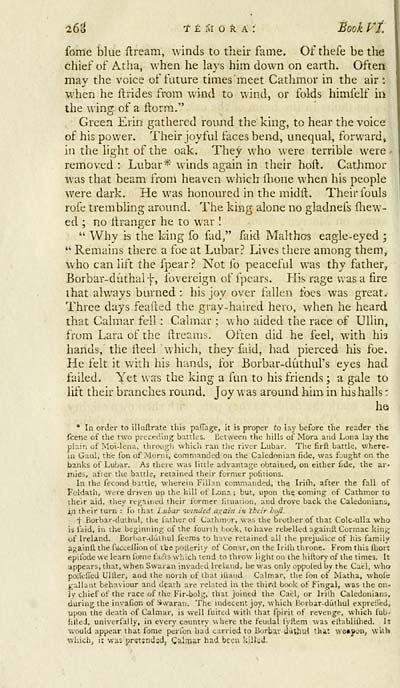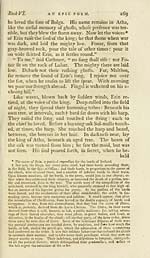Download files
Complete book:
Individual page:
Thumbnail gallery: Grid view | List view

^60 t E Si ft A : Book Vt
fome blue ftream, winds to their fame. Of thefe be the
chief of A-tha, when he lays him down on earth. Often
may the voice of future times meet Cathmor in the air ;
when he ftrides from wind to wind, or folds himfelf in
the wing- of a ftorm."
Green Erin gathered round the king, to hear the voice
of his power. Their joyful faces bend, unequal, forward,
in the light of the oak. They who were terrible were ^
removed : Lubar* winds again in their hofl. CatJimor
was that beam from heaven which fiione when his people
were dark. He was honoured in the midft. Their fouls
rofe trembling around. The king alone no gladnefs fliew-
ed ; no llranger he to war I
" Why is the king fo fad," faid Malthos eagle-eyed ;
" Remains there a foe at Lubar? Lives there among them,
who can lift the fpear? Not fo peaceful was thy father,
Borbar-duthaif, Ibvereign of fpcars. His rage was a fire
that always burned : his joy over fallen foes was great.
Three days feailed the gray-haired hero, when he heard
that Calmar fell : Calmar ; who aided the race of Ullin,
from Lara of the llreams. Often did he feel, with hia
hands, the ll:eel which, they faid, had pierced his foe.
He felt it with his hands, for Borbar-duthul's eyes had
failed. Yet was the king a fun to his friends ; a gale to
lift their branches round. Joy w as around him in his halls :
he
* In order to illuftrate this paffage, it is proper to lay before tlie reader the
fcene of the two preceding battles. Between the hills of Mora and Lona lay the
plain of Moi-lena, throiigli whic'n ran tlie river Lubar. The firll battle, where-
in Gaul, the fon of Morni, commanded on the Caledonian fide, was fought on the
banks of Lubar. As there was little advantage obtained, on either fide, the ar-
mies, after the battle, retained their former politions.
In the fecond battle, wherein Fillan commanded, the Iri(h, after the fall of
Foldath, were driven up the hill of Lona ; but, upon thq coming of Cathinor to
iheir aid, they regained their former fituation, and drove back, the Caledonians,
ill their turn : fo that Lubar wmJed a^ain in 'their hujl.
f Borbar-duthul, the lather of Cathmor, was the brother of that Colc-ulla who
is laid, in the beginning of the founii Look, to have rebelled againilCormac king
of Ireland. Borliar-dulhul feems to have retained all the prejudice of his family
againll the fucceUion of tbe poileriiy of Conar, on the Irilh throne. From this fliort
epifode we learn fome fails which tend to throw light on the hillory of the times. It
appears, that, when Swaran invaded Ireland, he was only oppoled by the Cael, who
pollefied UUler, and the north of that iUaud Calmar,'the fon of Watha, whofe
gallant behaviour and death are related in the third book of Fingal, was the on-
ly chief of the race of the Fir-bolg, that joined the Gael, or Iri(h Caledonians,
during the invafion of .'iwaran. The indecent joy, which Borbar-duthul exprell'ed,
upon the death of Calmar, is well fuited with that fpirit of revenge, which I'ub-
hlted, univerfaily, in every country where the feudal fyftem was elhibliflied. It
would appear that fome perfon had carried to Borbar dutJiiH that wenpon, wUh
which, it was pretjndsd, Calmar had been killed.
fome blue ftream, winds to their fame. Of thefe be the
chief of A-tha, when he lays him down on earth. Often
may the voice of future times meet Cathmor in the air ;
when he ftrides from wind to wind, or folds himfelf in
the wing- of a ftorm."
Green Erin gathered round the king, to hear the voice
of his power. Their joyful faces bend, unequal, forward,
in the light of the oak. They who were terrible were ^
removed : Lubar* winds again in their hofl. CatJimor
was that beam from heaven which fiione when his people
were dark. He was honoured in the midft. Their fouls
rofe trembling around. The king alone no gladnefs fliew-
ed ; no llranger he to war I
" Why is the king fo fad," faid Malthos eagle-eyed ;
" Remains there a foe at Lubar? Lives there among them,
who can lift the fpear? Not fo peaceful was thy father,
Borbar-duthaif, Ibvereign of fpcars. His rage was a fire
that always burned : his joy over fallen foes was great.
Three days feailed the gray-haired hero, when he heard
that Calmar fell : Calmar ; who aided the race of Ullin,
from Lara of the llreams. Often did he feel, with hia
hands, the ll:eel which, they faid, had pierced his foe.
He felt it with his hands, for Borbar-duthul's eyes had
failed. Yet was the king a fun to his friends ; a gale to
lift their branches round. Joy w as around him in his halls :
he
* In order to illuftrate this paffage, it is proper to lay before tlie reader the
fcene of the two preceding battles. Between the hills of Mora and Lona lay the
plain of Moi-lena, throiigli whic'n ran tlie river Lubar. The firll battle, where-
in Gaul, the fon of Morni, commanded on the Caledonian fide, was fought on the
banks of Lubar. As there was little advantage obtained, on either fide, the ar-
mies, after the battle, retained their former politions.
In the fecond battle, wherein Fillan commanded, the Iri(h, after the fall of
Foldath, were driven up the hill of Lona ; but, upon thq coming of Cathinor to
iheir aid, they regained their former fituation, and drove back, the Caledonians,
ill their turn : fo that Lubar wmJed a^ain in 'their hujl.
f Borbar-duthul, the lather of Cathmor, was the brother of that Colc-ulla who
is laid, in the beginning of the founii Look, to have rebelled againilCormac king
of Ireland. Borliar-dulhul feems to have retained all the prejudice of his family
againll the fucceUion of tbe poileriiy of Conar, on the Irilh throne. From this fliort
epifode we learn fome fails which tend to throw light on the hillory of the times. It
appears, that, when Swaran invaded Ireland, he was only oppoled by the Cael, who
pollefied UUler, and the north of that iUaud Calmar,'the fon of Watha, whofe
gallant behaviour and death are related in the third book of Fingal, was the on-
ly chief of the race of the Fir-bolg, that joined the Gael, or Iri(h Caledonians,
during the invafion of .'iwaran. The indecent joy, which Borbar-duthul exprell'ed,
upon the death of Calmar, is well fuited with that fpirit of revenge, which I'ub-
hlted, univerfaily, in every country where the feudal fyftem was elhibliflied. It
would appear that fome perfon had carried to Borbar dutJiiH that wenpon, wUh
which, it was pretjndsd, Calmar had been killed.
Set display mode to: Large image | Transcription
Images and transcriptions on this page, including medium image downloads, may be used under the Creative Commons Attribution 4.0 International Licence unless otherwise stated. ![]()
| Early Gaelic Book Collections > Ossian Collection > Poems of Ossian, the son of Fingal > (282) |
|---|
| Permanent URL | https://digital.nls.uk/77585878 |
|---|
| Description | Selected books from the Ossian Collection of 327 volumes, originally assembled by J. Norman Methven of Perth. Different editions and translations of James MacPherson's epic poem 'Ossian', some with a map of the 'Kingdom of Connor'. Also secondary material relating to Ossianic poetry and the Ossian controversy. |
|---|
| Description | Selected items from five 'Special and Named Printed Collections'. Includes books in Gaelic and other Celtic languages, works about the Gaels, their languages, literature, culture and history. |
|---|

